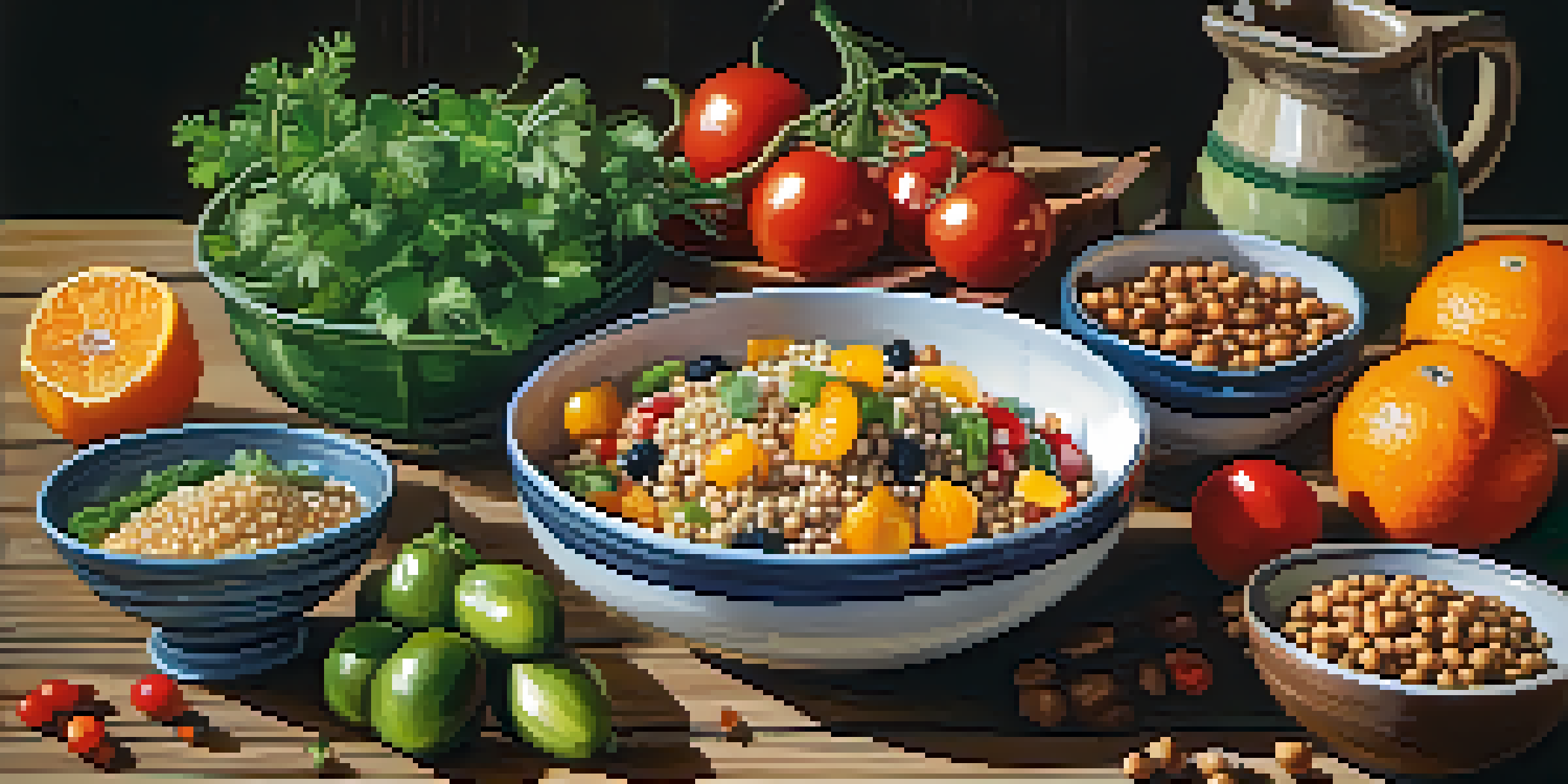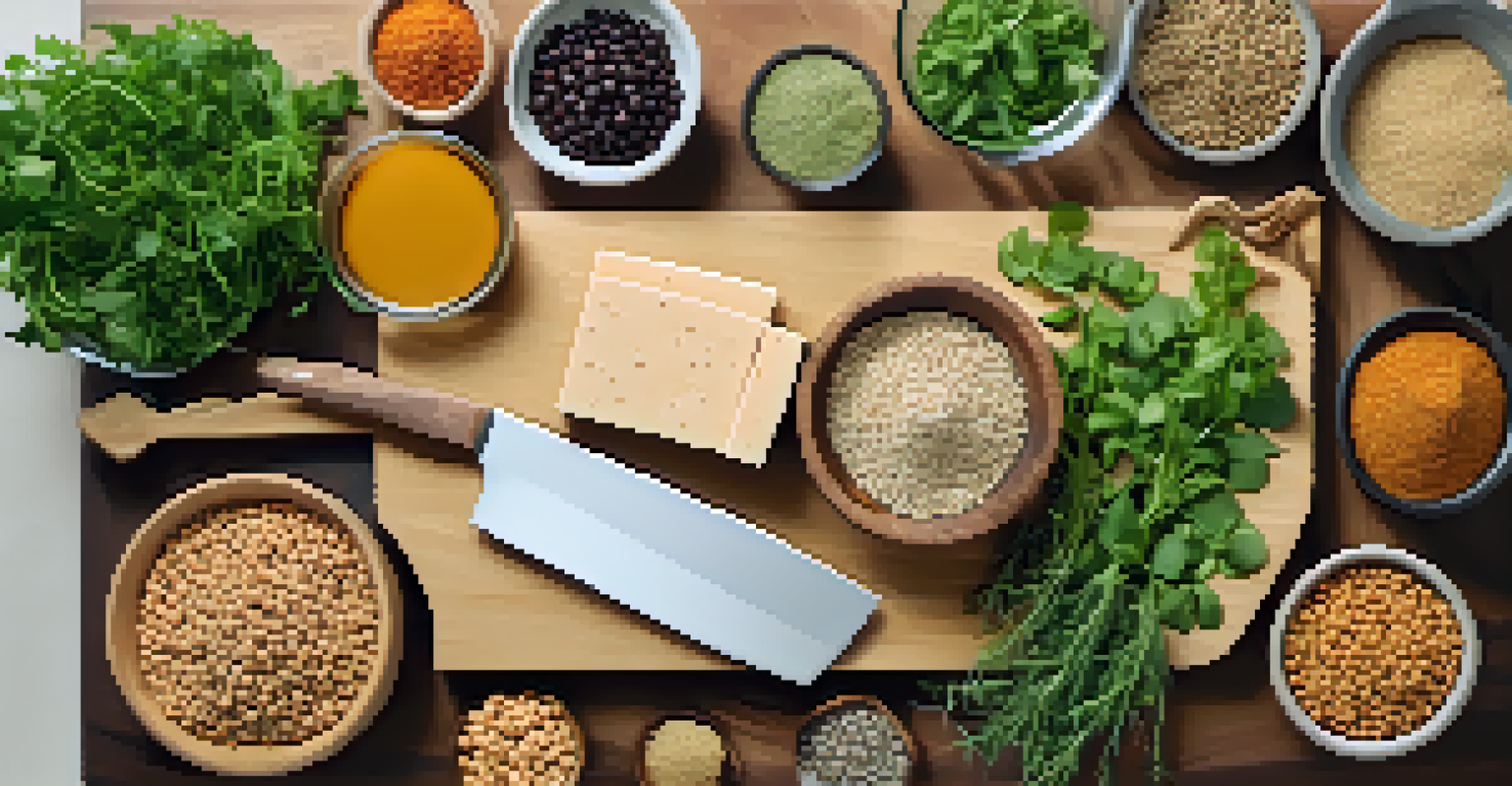How to Address Common Concerns About Vegetarian Diets

Understanding Nutritional Balance in Vegetarian Diets
One of the primary concerns about vegetarian diets is whether they can provide all the necessary nutrients. It's a common misconception that meat is the only source of essential proteins and vitamins. In reality, a well-planned vegetarian diet can offer a rich variety of nutrients from plant-based sources such as beans, nuts, and whole grains.
Let food be thy medicine, and medicine be thy food.
For instance, lentils are not only high in protein but also packed with fiber and iron. Incorporating a rainbow of fruits and vegetables ensures a well-rounded intake of vitamins. With a little attention to meal planning, vegetarians can easily meet their nutritional needs.
Additionally, many plant-based foods are fortified with nutrients like B12 and vitamin D, essential for health. This means that vegetarians don't have to miss out on these crucial components if they choose wisely.
Protein Sources: Debunking the Myths
A common myth is that vegetarians struggle to get enough protein. However, there are countless plant-based protein sources available that can easily fulfill daily requirements. Foods like quinoa, chickpeas, and tofu are excellent examples of protein-rich options that can be incorporated into meals.

To put it into perspective, a cup of cooked lentils contains about 18 grams of protein, which is comparable to a serving of chicken. This means vegetarians can not only meet but often exceed their protein needs through diverse food choices. Plus, plant-based proteins come with added health benefits like fiber and antioxidants.
Nutritional Balance in Vegetarian Diets
A well-planned vegetarian diet can provide all necessary nutrients through diverse plant-based sources.
It's also worth noting that combining different plant proteins, such as rice and beans, can create a complete amino acid profile. This makes it easier for vegetarians to get all the essential amino acids necessary for a healthy body.
Addressing Concerns about Iron Intake
Iron is another nutrient that often raises concerns for those following a vegetarian diet. While it's true that plant-based iron (non-heme iron) is less easily absorbed than the heme iron found in meat, there are plenty of vegetarian-friendly sources. Foods like spinach, legumes, and fortified cereals are rich in iron.
Eating plants is good for your health and the health of the planet.
To improve iron absorption, pairing these foods with vitamin C-rich items like oranges or bell peppers can be incredibly effective. This simple strategy can help transform iron intake from plant sources into something that supports healthy blood levels.
Regular monitoring of iron levels is a good practice for vegetarians, particularly in the initial stages of dietary change. With a bit of knowledge and creativity, ensuring adequate iron intake can be a seamless part of a vegetarian lifestyle.
Calcium and Vitamin D: Meeting Your Needs
Calcium and vitamin D are crucial for bone health, and many worry about getting enough from a vegetarian diet. However, there are various non-dairy sources of calcium, such as fortified plant milks, leafy greens, and almonds. Each of these options can help maintain strong bones without relying on dairy.
Vitamin D can be a bit trickier since it’s primarily found in animal products and fortified foods. However, spending some time in the sun can help your body produce its own vitamin D. For those who live in less sunny areas, supplements can be a beneficial option.
Overcoming Protein Myths
Vegetarians can easily meet their protein needs with plant-based options like lentils, quinoa, and tofu.
By diversifying your food choices and incorporating fortified products, you can easily cover your calcium and vitamin D needs while enjoying a vegetarian diet.
Navigating Social Situations as a Vegetarian
Social situations can sometimes pose challenges for vegetarians, especially during gatherings centered around food. It's essential to communicate your dietary preferences and needs to friends and family. Often, they will be more than willing to accommodate and even learn some new recipes.
Bringing a vegetarian dish to share can also take the pressure off and ensure there's something delicious for you to enjoy. Plus, it can introduce others to the variety and flavors of vegetarian cuisine, sparking curiosity.
Remember, being a vegetarian is a lifestyle choice that can inspire others to explore healthier eating habits, making social gatherings an opportunity rather than a challenge.
Overcoming Common Misconceptions
There are many misconceptions about vegetarian diets, such as the belief that they lack flavor or variety. In reality, vegetarian cuisine is incredibly diverse, drawing inspiration from cultures around the world. From spicy Indian chickpea curry to fresh Mediterranean salads, the flavor possibilities are endless.
Another myth is that vegetarian diets are expensive. While some specialty products might carry a higher price tag, staples like rice, beans, and seasonal vegetables are often quite affordable. In fact, cooking at home can significantly reduce food costs while allowing for creativity in meal preparation.
Sustainability of Vegetarian Choices
Choosing a vegetarian diet can significantly lower one's carbon footprint and promote environmental health.
By debunking these misconceptions, it becomes clearer that a vegetarian diet can be both flavorful and budget-friendly, making it an appealing choice for many.
Sustainability Benefits of Vegetarian Diets
Many people choose vegetarian diets for ethical or environmental reasons, and rightly so. A vegetarian lifestyle typically has a lower carbon footprint compared to meat-based diets. This means that choosing plant-based meals can be a simple yet effective way to contribute to a healthier planet.
Moreover, the resources required to raise livestock for meat are significantly greater than those needed to grow vegetables. By reducing meat consumption, we can help conserve water, reduce greenhouse gas emissions, and mitigate deforestation.

Adopting a vegetarian diet can thus be seen as a small step that leads to a larger collective impact on the environment, encouraging others to consider their food choices as well.
Making the Transition to a Vegetarian Diet
Shifting to a vegetarian diet doesn't have to happen overnight; it's a personal journey that can be tailored to individual preferences. Starting with one or two meatless days a week can help ease the transition. Gradually introducing more plant-based meals allows you to discover new flavors and recipes at your own pace.
Exploring vegetarian cookbooks, online blogs, or joining local vegetarian groups can provide valuable resources and support. Connecting with others on the same path can offer motivation and inspiration.
Ultimately, the goal is to find a balance that works for you, making the journey enjoyable and sustainable. Embracing this lifestyle can lead to a deeper appreciation for food and the benefits it brings.